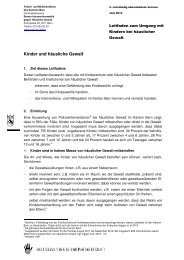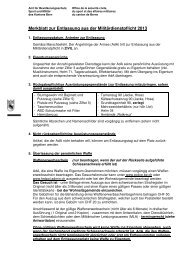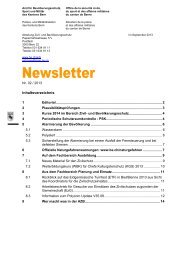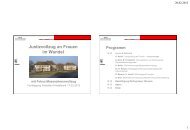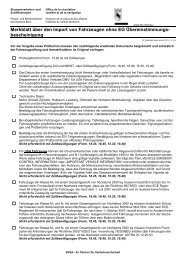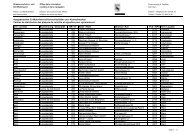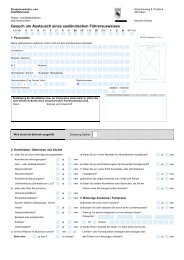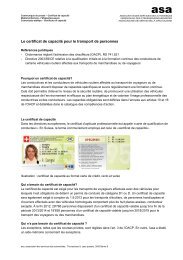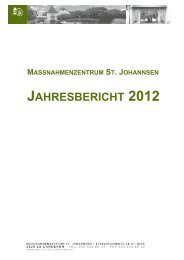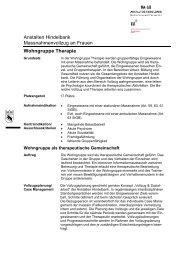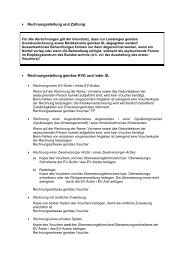Merkblatt Familienforschung Englisch
Merkblatt Familienforschung Englisch
Merkblatt Familienforschung Englisch
You also want an ePaper? Increase the reach of your titles
YUMPU automatically turns print PDFs into web optimized ePapers that Google loves.
Zivilstands- und<br />
Bürgerrechtsdienst<br />
des Kantons Bern<br />
Service de l’état civil<br />
et des naturalisations<br />
du canton de Berne<br />
Civil Status and<br />
Naturalisation Service of<br />
the Canton of Berne<br />
Amt für Migration<br />
und Personenstand<br />
Office de la population<br />
et des migrations<br />
Population and Migration<br />
Office<br />
Information provided by Bernese civil status registries<br />
1. Data protection<br />
Civil status data are subject to particularly stringent protection. Civil status registries are not<br />
permitted to provide any information about living persons as a matter of principle. If you require<br />
data about living relatives, we recommend that you should establish direct contact with the<br />
people concerned.<br />
Civil status registries provide written information about living and deceased persons on the basis<br />
of the provisions outlined below, and they permit applicants to inspect civil status registers of<br />
earlier times. They do not provide any verbal information about registered civil status data.<br />
The cantonal authority supervising civil status registries does not grant any permit under data<br />
protection law to inspect citizens’ registers that are kept in the Burgergemeinden or burghers’<br />
communities. Applications for such permits must be submitted to the respective<br />
Burgergemeinden (pursuant to the Cantonal Data Protection Act).<br />
2. Registration system<br />
a) Event registers<br />
Births, acknowledgements of paternity, marriages and death are registered at the place<br />
where they occur (i.e. at the place of birth, death, acknowledgement and marriage). These data<br />
are collected in event registers and are located in the relevant civil status registries. Our website<br />
tells you which civil status registry is responsible for which municipality.<br />
b) Collective registers<br />
Collective registers have been kept in the place of origin since 1822. As a rule, these citizens’<br />
and family registers are in the safekeeping of the civil status registry that is responsible for the<br />
place of origin. A register sheet is created for every family in accordance with the principle<br />
applicable at that time; this sheet lists not only the husband or father, but also his wives and<br />
children. Research into the distaff line, however, is far more time-consuming because on getting<br />
married, every wife obtained a new place of origin. Our website tells you which civil status<br />
registry is responsible for which place of origin.<br />
3. Forms of information<br />
a) Written information<br />
Written information (excerpts from registers, documents) must refer to the following data:<br />
• data which concern the enquirer himself or herself,<br />
• data which concern the enquirer’s own dead ancestors in the direct line (parents,<br />
grandparents, great-grandparents).
For data concerning<br />
• siblings, aunts, uncles, etc. (relatives in a collateral line),<br />
• the enquirer’s own offspring and<br />
• persons related to the enquirer by marriage,<br />
written information can be provided under the following conditions:<br />
• the enquirer’s interest in the data is worthy of being protected,<br />
• there is evidence that this information cannot be obtained from the persons in question.<br />
All the excerpts from registers and documents provided by civil status registries are subject to a<br />
charge.<br />
b) Inspection of civil status registers of earlier times<br />
Inspection subject to a permit<br />
On request, and subject to a permit granted by the supervisory authority under data protection<br />
law, a civil status registry allows enquirers to inspect civil registers of earlier times, i.e., in<br />
concrete terms, registers that have been closed and whose protection terms have expired.<br />
An individual register is closed with the registration of the event (birth, death, marriage,<br />
acknowledgement of paternity). A family or citizens’ register is deemed closed when all the<br />
persons listed on the sheet have been transferred to a different register or all the persons listed<br />
on the sheet are deceased.<br />
This means that after compliance with the protection terms, inspection of the following civil status<br />
registers on the strength of a permit granted by the supervisory authority under data protection<br />
law is regulated as follows:<br />
• birth, legitimation and acknowledgement of paternity registers: prior to 1910;<br />
• death registers: prior to 2004;<br />
• marriage registers: prior to 1930;<br />
• citizens’ registers: 1876 to 1928 (prior to 1876: no permit required);<br />
• family registers (from 1929): generally no inspection.<br />
The requisite qualifications and the documents to be submitted for inspection subject to a permit<br />
are listed on the application form. This form can be printed out on our website or be obtained<br />
from the supervisory authority. It must be filled in completely and submitted to the supervisory<br />
authority.<br />
The supervisory authority makes a possible permit contingent on certain requirements, not least<br />
in the interest of data protection:<br />
• researchers must be able to read old German handwriting;<br />
• the ledgers must be treated with every possible care during the inspection;<br />
• the registers must not be removed from the premises of the civil status registry;<br />
• owing to the provisions of data protection law, no photographs must be taken and no<br />
photocopies must be made of civil status registers;<br />
• if in the course of their work, researchers come across data concerning living persons, such<br />
data may only be used with the consent of the persons concerned.<br />
2
Costs<br />
Annual permit for experts<br />
For an annual permit, which is only granted to professional genealogists and academic<br />
researchers and which is valid for the entire territory of the Canton of Berne, the supervisory<br />
authority charges a fee of CHF 150.00.<br />
Individual permit for amateur researchers<br />
An individual permit, which is granted to applicants such as amateur researchers who intend to<br />
do research into their own families, costs CHF 75.00. Such individual permits are limited to the<br />
registers of a civil status district, to the persons to be researched who are specifically covered by<br />
the permit, and to one year.<br />
Civil status registries charge a fee of CHF 75.00 per half hour for involvement in the consultation<br />
of registers that is not limited to mere supervision. Excerpts from registers and documents of a<br />
civil status registry are subject to a charge as a matter of principle.<br />
Inspection for which no permit is required<br />
Citizens’ registers that date back to before 1876 may be inspected without a permit. You have<br />
to contact the civil status supervisory authority in advance in writing.<br />
The ledgers must be treated with every possible care during the inspection. The registers must<br />
not be removed from the premises of the civil status registry. Excerpts from registers and<br />
documents of a civil status registry are subject to a charge. Owing to the provisions of data<br />
protection law, no photographs must be taken and no photocopies must be made of civil status<br />
registers.<br />
Civil status registries charge a fee of CHF 75.00 per half hour for involvement in the consultation<br />
of registers that is not limited to mere supervision.<br />
With only a few exceptions, the Bernese parish registers (churchbooks, i.e. records of baptisms,<br />
marriages and deaths from about 1530 to 1876) are in the safekeeping of the Cantonal Archives.<br />
The microfilms of the Parish Registers may be viewed every Friday in the reading room. A<br />
registration ahead of time by phone or email is necessary. No permit is required.<br />
Address: Staatsarchiv des Kantons Bern, Falkenplatz 4, 3012 Bern; Tel: 031 633 51 01;<br />
www.be.ch/statearchive<br />
4. No inspection of more recent civil status registers<br />
For data protection reasons, civil status registries do not permit researchers to inspect more<br />
recent civil status registers, i.e. registers that are not closed and registers that are closed but<br />
whose protection term has not yet expired. This applies to family registers, among others.<br />
You can find the addresses and telephone numbers of the Bernese civil status registries at<br />
www.pom.be.ch, Civil status registries (in German and French only).<br />
Address of the supervisory authority of the Canton of Berne: Zivilstands- und Bürgerrechtsdienst<br />
des Kantons Bern, Aufsichtsbehörde, Team Zivilstandsfragen, Eigerstrasse 73, 3011 Bern.<br />
Telephone: +41 (0)31 633 73 73.<br />
3



